ANTHROPOLOGY
The Study Of Everything And Anything That Makes Us Human
Prabhu TL

Nestfame Creations Pvt. Ltd.
[ Anthropology ]
Copyright [2021] Prabhu TL. All rights reserved.
Publisher - Nestfame Creations Pvt. Ltd.
Publisher Website - www.nestfamecreations.com
The contents of this book may not be reproduced, duplicated or transmitted without direct written permission from the Author .
Under no circumstances will any legal responsibility or blame be held against the publisher for any reparation, damages, or monetary loss due to the information herein, either directly or indirectly.
Author - Prabhu TL
Legal Notice:
This book is copyright protected. This is only for personal use. You cannot amend, distribute, sell, quote or paraphrase any part or the content within this book without the consent of the author.
Disclaimer Notice:
Please note the information contained within this document is for educational and entertainment purpose only .every attempt has been made to provide accurate, up to date and reliable complete information. No warranties of any kind are expressed or implied. Please consult a licensed professional before attempting any techniques outlined in this book .
By reading this document, the reader agrees that under no circumstances are is the author responsible for any losses, direct or indirect, which are incurred as a result of the use of information contained within this document, including, but not limited to, __eRrors, omissions, or inaccuracies.
PREFACE
Derived from Greek, the word anthropos means human and logy refers to the study of. Quite literally, anthropology is the study of humanity. It is the study of everything and anything that makes us human. From cultures, to languages, to material remains and human evolution, anthropologists examine every dimension of humanity by asking compelling questions like: How did we come to be human and who are our ancestors? Why do people look and act so differently throughout the world? What do we all have in common? How have we changed culturally and biologically over time? What factors influence diverse human beliefs and behaviors throughout the world?
You may notice that these questions are very broad. Indeed, anthropology is an expansive field of study. It is comprised of four subfields that in the United States include cultural anthropology, archaeology, biological (or physical) anthropology, and linguistic anthropology. Together, the subfields provide a multi-faceted picture of the human condition. Applied anthropology is another area of specialization within or between the anthropological subfields. It aims to solve specific practical problems in collaboration with governmental, non-profit, and community organizations as well as businesses and corporations.
It is important to note that in other parts of the world, anthropology is structured differently. For instance, in the United Kingdom and many European countries, the subfield of cultural anthropology is referred to as social (or socio-cultural) anthropology. Archaeology, biological anthropology, and linguistic anthropology are frequently considered to be part of different disciplines. In some countries, like Mexico, anthropology tends to focus on the cultural and indigenous heritage of groups within the country rather than on comparative research. In Canada, some university anthropology departments mirror the British social anthropology model by combining sociology and anthropology. As noted above, in the United States and most commonly in Canada, anthropology is organized as a four-field discipline.
Hollywood has given us a peculiar and misleading picture of what anthropology is about. What comes to mind is usually one of two stereotypical images, both of which are inaccurate at best. The first is that of an absent-minded, bookish eccentric who spends his life in odd corners of the world searching out strange customs. The other is the rugged, self-reliant, fictional adventurer archaeologist Indiana Jones in the Raiders of the Lost Ark . The reality is that anthropologists are trained scientists who usually work as university professors or museum curators. Some have jobs in environmental analysis companies or government organizations such as national park services and agencies for indigenous peoples. Other anthropologists work in major corporations and even the police and the military.
Anthropological research covers a wide range of topics and is generally done by teams of scientists rather than lone explorers. Some anthropologists are interested in discovering, through the fossil record and DNA, how we evolved. Some focus on the nature of human biology in order to understand how we adapt to different environmental conditions and how we vary as a species. Some work with the police or the military to identify people from their skeletal remains. Others observe the behavior of monkeys and apes in their natural settings. Still others live in different societies around the world for months or even years to learn their language and to understand their customs and way of life. And, yes, some anthropologists excavate the archaeological remains of ancient cultures to find out what our ancestors did and how they lived.
Often anthropologists work with scientists from other fields of study such as public health, agronomy, zoology, and botany. This interdisciplinary approach to research has become particularly important in understanding the fossil record of early humans and their ancestors as well as the archaeological record of more recent prehistoric societies. In fact, most sciences at the forefront of discovery today are doing research at the intersection with other sciences.
The word "anthropology" was first used in English as early as 1593. However, anthropology as a distinct academic discipline is comparatively young. Its roots go back to the intellectual Enlightenment of the 18th and early 19th centuries in Europe and North America. As European nations developed colonies in distant parts of the world and Americans expanded west and south into the territories of Indians, it became apparent to them that humanity was extremely varied. Anthropology began, in part, as an attempt by members of scientific societies to objectively record and comprehend this variation. Curiosity about strange people and customs in far off parts of the world is what primarily motivated these early amateur anthropologists. By profession, they most often were naturalists, medical doctors, Christian clerics, or educated explorers. They asked such fundamental questions as whether or not the differences between human cultures are the result of genetic inheritance and if there is a relationship between the size of a human brain and intelligence. As a consequence of this pioneering research, we now understand that the answer to both of these questions is no. It was not until the late 19th century that anthropology finally became a separate academic discipline in American and Western European universities. Today, it is an international science with anthropologists in most nations of the world. They are now asking fascinating new questions about the nature of humanity in all of our varied societies. The answers to many of these questions are the focus of this tutorial series.
The word anthropology comes from the Greek anthropos , meaning human being. Anthropology is a broad scientific study of human biology and culture  . It strives to understand what defines us as humans and to explain how we got to be the way we are. History, philosophy, biology, and some other academic fields are also interested in learning what it means to be human. Anthropologists generally differ in their more inclusive holistic approach --they are interested in learning about both the biological and cultural aspects of humanity around the globe and throughout time. They recognize that the considerable variability of our human experience requires an unbiased cultural relativity approach and cross-cultural comparisons to comprehend it. They also have come to realize that people cannot be understood by studying either their biological makeup or their cultural traditions alone. It is necessary to take into consideration both genetically inherited and learned traits in trying to explain how we have become what we are and how we differ from one another.
. It strives to understand what defines us as humans and to explain how we got to be the way we are. History, philosophy, biology, and some other academic fields are also interested in learning what it means to be human. Anthropologists generally differ in their more inclusive holistic approach --they are interested in learning about both the biological and cultural aspects of humanity around the globe and throughout time. They recognize that the considerable variability of our human experience requires an unbiased cultural relativity approach and cross-cultural comparisons to comprehend it. They also have come to realize that people cannot be understood by studying either their biological makeup or their cultural traditions alone. It is necessary to take into consideration both genetically inherited and learned traits in trying to explain how we have become what we are and how we differ from one another.
Next page
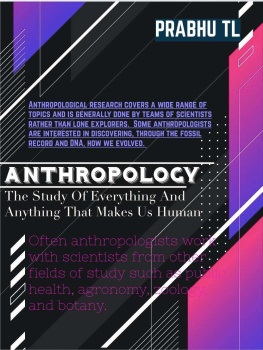



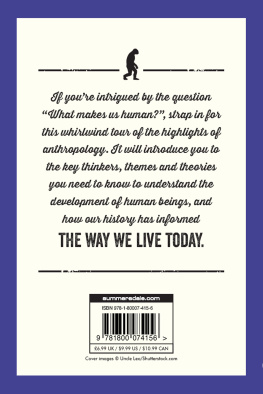
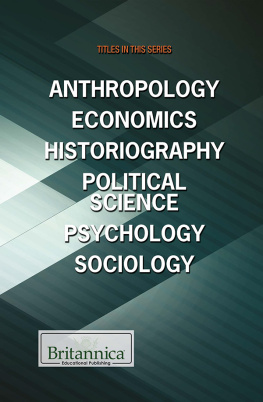
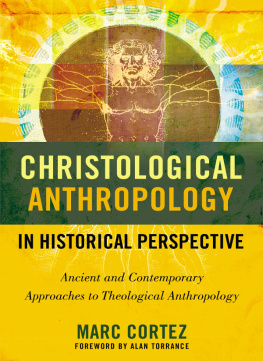
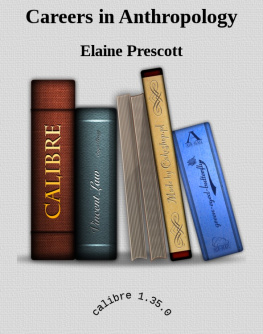
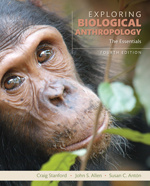



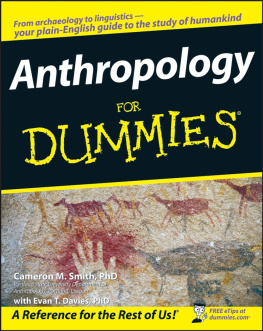
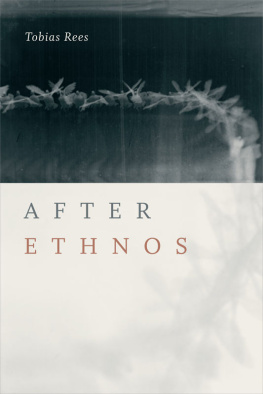

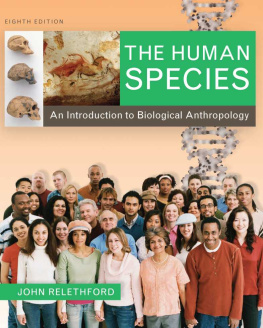

 . It strives to understand what defines us as humans and to explain how we got to be the way we are. History, philosophy, biology, and some other academic fields are also interested in learning what it means to be human. Anthropologists generally differ in their more inclusive holistic approach --they are interested in learning about both the biological and cultural aspects of humanity around the globe and throughout time. They recognize that the considerable variability of our human experience requires an unbiased cultural relativity approach and cross-cultural comparisons to comprehend it. They also have come to realize that people cannot be understood by studying either their biological makeup or their cultural traditions alone. It is necessary to take into consideration both genetically inherited and learned traits in trying to explain how we have become what we are and how we differ from one another.
. It strives to understand what defines us as humans and to explain how we got to be the way we are. History, philosophy, biology, and some other academic fields are also interested in learning what it means to be human. Anthropologists generally differ in their more inclusive holistic approach --they are interested in learning about both the biological and cultural aspects of humanity around the globe and throughout time. They recognize that the considerable variability of our human experience requires an unbiased cultural relativity approach and cross-cultural comparisons to comprehend it. They also have come to realize that people cannot be understood by studying either their biological makeup or their cultural traditions alone. It is necessary to take into consideration both genetically inherited and learned traits in trying to explain how we have become what we are and how we differ from one another.